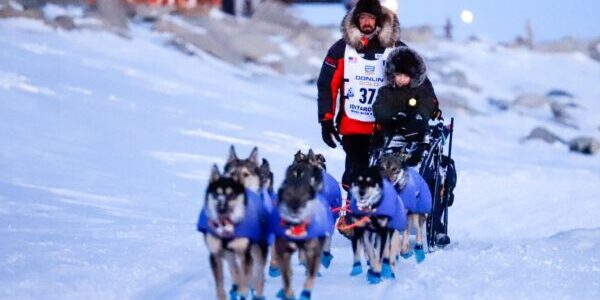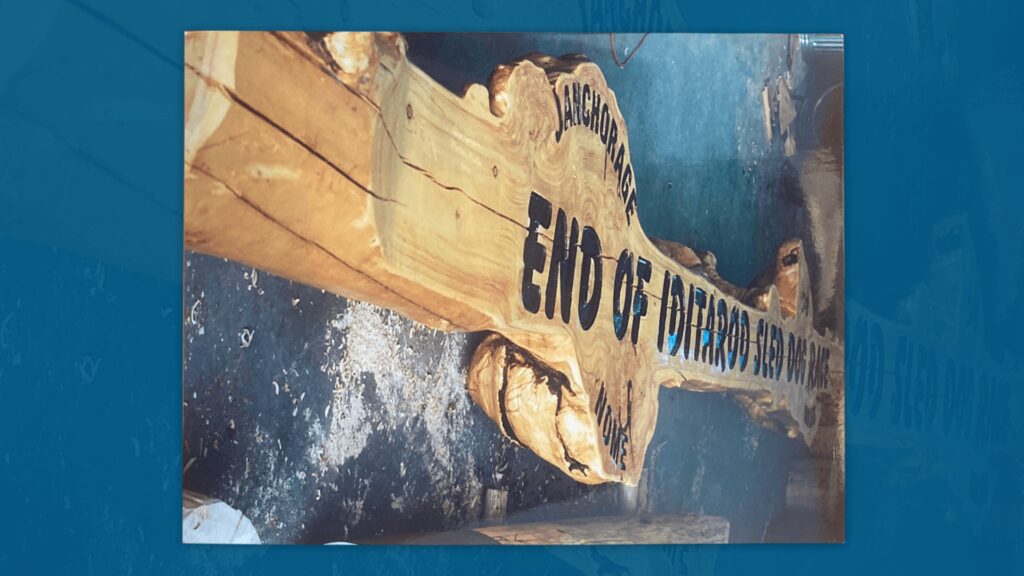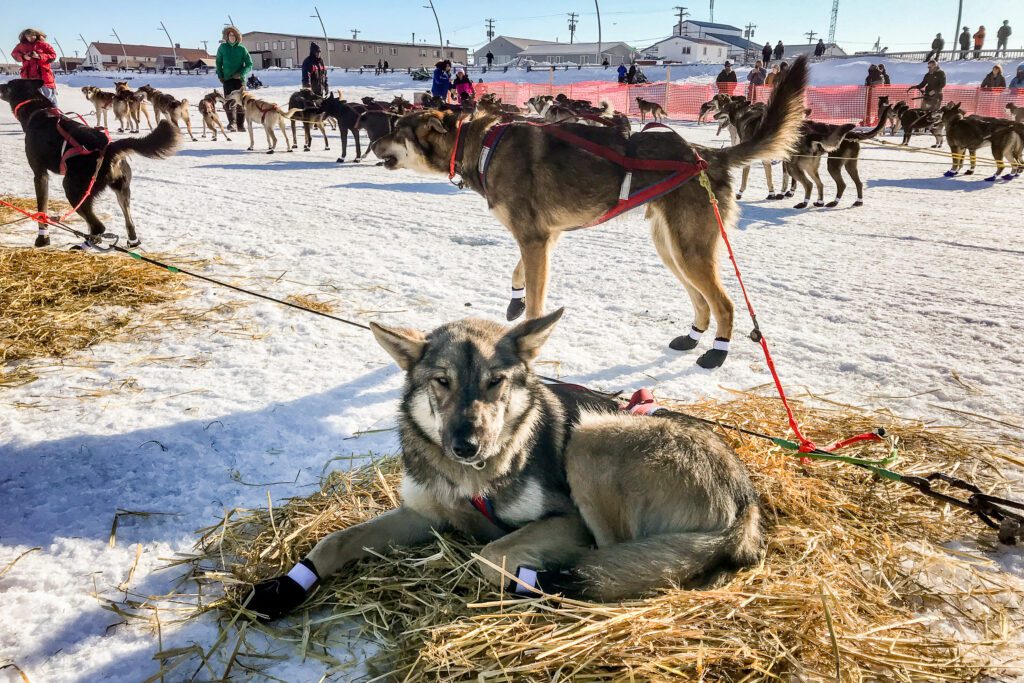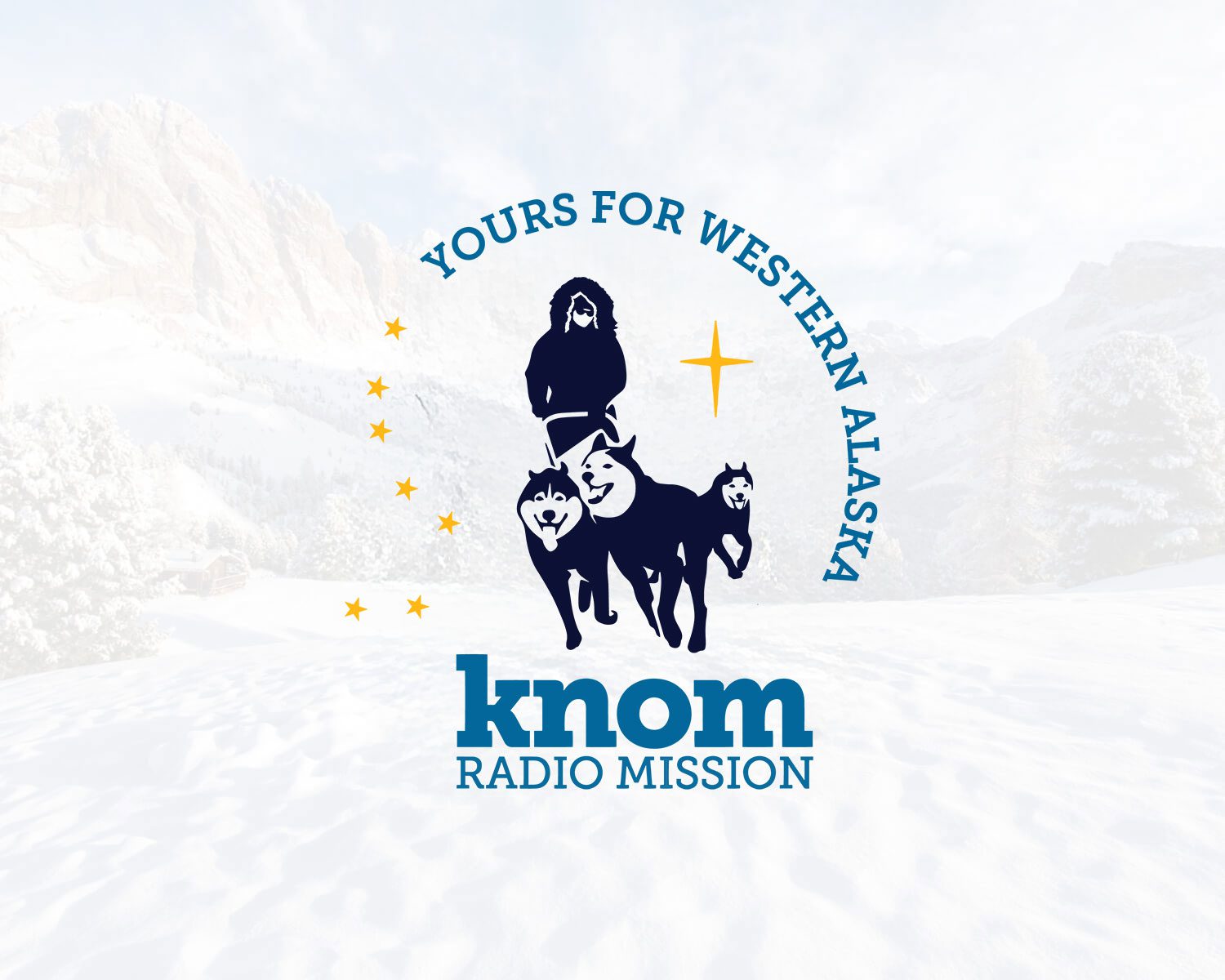Pete Kaiser raced across the Iditarod finish line at 9:45 p.m. Tuesday in fifth place.
Alaska Public Media’s Anna Rose MacArthur reports:
Family and friends from Anchorage, Aniak, and his hometown of Bethel crowded beneath the famed burled arch on Nome’s Front Street to welcome him.
After stomping down his snow hook, Kaiser walked down the line of his nine dogs, rubbing each of their faces. Esteemed former Iditarod racer DeeDee Jonrowe, wearing a signature pink parka, pressed her face to the dogs’ snouts, telling them hello. Kaiser’s father, Ron, fed the dogs raw stew tips. Fans pressed close to the race chute, holding up smartphones.
Kaiser completed his race in 9 days, 6 hours, 45 minutes, and 15 seconds. It marks his 13th Iditarod and seventh top 10 finish.
Over the finish line loudspeaker, Iditarod race marshal Mark Nordman made an announcement: “I wanted everyone to know that Pete carried a little cargo this year.”
The family of Dick Wilmarth, the first Iditarod winner, had asked Kaiser to carry his ashes down the trail, along with his trading card. Wilmarth was from the middle Kuskokwim River community of Red Devil and died in 2018.
“A total honor to do that,” Kaiser said. “Obviously he’s from the Kuskokwim River, just like I am, and we’re both Iditarod winners. He was the first Iditarod winner. This is the 50th anniversary, so pretty special to have him ride with me in the sled down the trail.”
Kaiser won the race in 2019. He said that the large crowd of Yukon-Kuskokwim Delta fans who flew in made this finish feel like he’d won again.
Then a physician administered Kaiser’s final COVID-19 nasal swab test of the trail. He described that trail as hard-packed, icy, and consistent, which made for easy pulling.
He said that his run/rest schedule along the route was also consistent. With many young dogs on his team, he said this predictability would build trust with them. And if he could maintain that schedule through the race, it would appear laidback at first and then more aggressive along the coast.
Kaiser’s strategy worked. He ranked around 14th position for much of the race. When he hit the coast, he passed one team after another, jumping up the standings. In the final stretch between White Mountain and Safety, he overtook Aniak musher Richie Diehl.
He said the race changed his team.
“They’re totally different dogs now,” Kaiser said. “They’re going to go home and feel like they’re superman, so they’ll be full of confidence now after this.”
Diehl arrived at the finish line 17 minutes after Kaiser at 10:02 p.m. in sixth place. The same family and friends that had welcomed Kaiser also welcomed Diehl. The mushers are friends and grew up together; they’re his family and friends, too.
Diehl completed his race in 9 days, 7 hours, 2 minutes, and 13 seconds. It notched his ninth Iditarod run and third top 10 finish. The standings mirror the 2018 Iditarod, when Kaiser also finished in fifth place and Diehl in sixth.
Diehl concluded this year’s race with eight dogs. Only one of them had finished in Nome before. Like Kaiser, Diehl said that he’s ending with a stronger team than he started with.
“We battled some pretty good storms along the coast. They got to see the best of it, so I think they’ll be good in the future,” Diehl said.
He credited his lead dog Bruiser with helping the team make it through those storms. Another dog, Jimbo, was sent back to Anchorage early in the race. Jimbo escaped the Iditarod dog lot in the city and was found a day later. Diehl thanked everyone who helped look for him.
Before both mushers left the race chute, this year’s Iditarod champion, Brent Sass, shook both Kaiser and Diehl’s hands, congratulating them on their races. Fans cheered, whooping and clapping, as the mushers left to bed down their team after their 1,000-mile journey to Nome.
Image at top: Iditarod musher Pete Kaiser reaches Nome. His son hops on the led for the final stretch. (Jeff Chen/Alaska Public Media)







